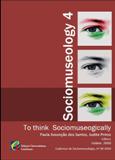Desire for memory, desire for museums: the experience of the Memory Hotspots
Abstract
Considering the principles of the National Museum Policy, created in 2003, the Brazilian Museums Institute – Ibram supports and encourages the development of museum practices and processes aimed at rewriting the history of social groups which were deprived of the right to narrate and exhibit their memories and their heritage. As effective action, in 2008, the Department of Museums and Cultural Centres (Demu/Iphan) – which gave rise to Ibram in January 2009 – started the Memory Hotspots Programme, with the main goal of fostering wide popular participation in matters related to social memory and museums.
The Memory Hotspots Programme was inspired in and directly influenced by the Ministry of Culture/MinC, which created the National Programme for Culture, Education and Citizenship (Living Culture). The purpose of this Programme is to contribute to make society conquer spaces, exchange experiences and develop initiatives that foster culture and citizenship, in a proactive manner. The partnership struck between civil society and the state power gave rise to Culture Hotspots, inspired in the anthropological “do-in” concept, idealized by the then Minster Gilberto Gil.
Downloads
Authors retain copyright and grant the journal right of first publication with the work simultaneously licensed under aCreative Commons Attribution License that allows others to share the work with an acknowledgement of the work's authorship and initial publication in this journal.













